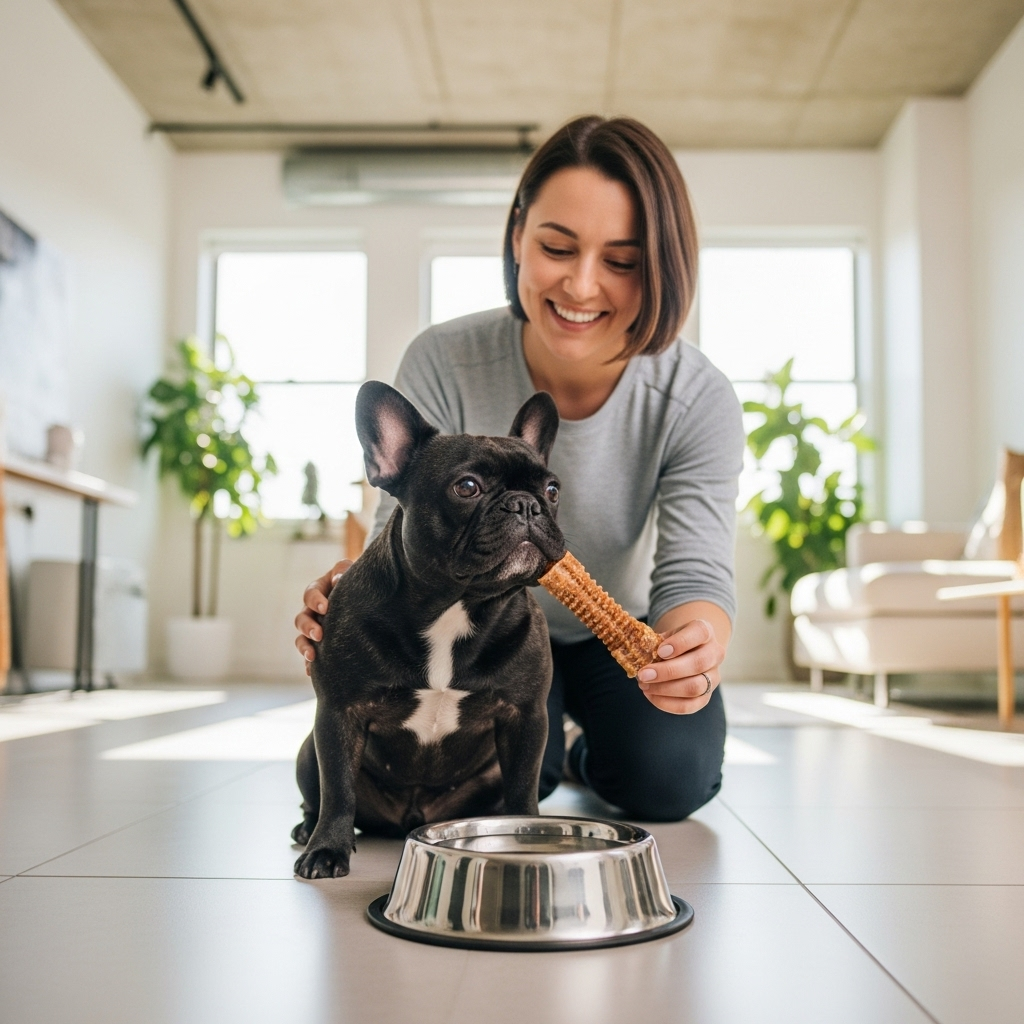Best Probiotics for Gassy French Bulldogs

If your French Bulldog is often gassy, it can be unpleasant for both of you. Gas in brachycephalic breeds like Frenchies is common because of their short snouts, fast eating, and sensitive digestive systems. Probiotics can help restore a healthy gut balance, reduce gas, and improve stool quality in many dogs. This guide explains how probiotics work, which strains and product features matter for French Bulldogs, how to use them safely, and when to consult your veterinarian.
Why French Bulldogs Get So Gassy
French Bulldogs are prone to digestive upset for several reasons:
- Fast eating and swallowing air (aerophagia) due to brachycephalic anatomy.
- Food sensitivities or intolerance (common with proteins, dairy, or certain carbohydrates).
- Imbalanced gut bacteria (dysbiosis) after stress, diet change, or antibiotics.
- Small intestinal bacterial overgrowth (SIBO), parasites, or other digestive disorders.
- Certain treats or human foods that ferment in the gut.
How Probiotics Help
Probiotics are live microorganisms that can help re-balance the gut microbiome. Benefits for gassy dogs include:
- Reducing gas-producing bacteria and supporting beneficial species.
- Improving nutrient absorption and stool consistency.
- Supporting immune health in the gut lining.
- Shortening the duration of diarrhea or loose stools in many cases.
Best Strains and Product Types for a Gassy French Bulldog
Not all probiotics are equal. Look for canine-specific formulations or strains with research or clinical use in dogs:
- Enterococcus faecium — commonly used in dog probiotics; supports gut balance and stool quality.
- Lactobacillus acidophilus & Lactobacillus rhamnosus — helpful for digestion and reducing gas in some dogs.
- Bifidobacterium animalis and B. breve — often included for intestinal health.
- Bacillus subtilis / Bacillus coagulans — spore-forming strains that survive stomach acid and can be practical for small dogs.
- Saccharomyces boulardii — a beneficial yeast, effective in managing diarrhea and supporting resilience after antibiotics; often used short-term.
Consider synbiotics (a probiotic combined with a prebiotic like FOS or MOS) to feed beneficial bacteria, but be cautious with prebiotics if your dog is sensitive — sometimes they increase gas initially.
How to Choose a Product
- Pick canine-specific or veterinarian-formulated probiotics when possible.
- Check the guaranteed CFU (colony-forming units) at the time of expiration, not just at manufacture.
- Prefer products that list strain-level information (e.g., Lactobacillus rhamnosus GG) rather than generic species only.
- Look for stability claims (shelf-stable or requires refrigeration) and follow storage directions.
- Avoid unnecessary fillers, artificial flavors, or high levels of added fiber that might worsen gas.
- Consider delivery form: powders and capsules that can be mixed with food, chews, or treats. Small dogs like Frenchies often do well with a powder sprinkled on food.
- If your dog is on antibiotics, talk to your vet about timing — some vets recommend spacing probiotic dosing several hours apart from antibiotics or using Saccharomyces boulardii during treatment.
Typical Dosage Guidelines
Dosage depends on product CFU and your dog’s size. Common recommendations:
- Small dogs (under 10–15 lb): often 1–2 billion CFU daily, depending on product instructions.
- Medium dogs: 2–5 billion CFU daily.
- Higher CFU (5–10+ billion) products exist, but start low and follow label/veterinarian guidance.
Always follow product labeling or your veterinarian’s recommendation. If your Frenchie has a medical condition or is immunocompromised, consult your vet before starting any probiotic.
Administration Tips
- Give the probiotic with or right after a meal — food buffers stomach acid and improves probiotic survival.
- Introduce probiotics slowly: start with a half-dose for a few days to watch for increased gas or loose stool, which sometimes occurs initially.
- Be consistent. Many dogs need 2–4 weeks of daily use to show improvement in gas and stool quality.
- Keep a food diary to see if diet changes or certain treats trigger gas — probiotics help but won’t solve intolerances.
When to See the Veterinarian
If your French Bulldog shows any of the following, seek veterinary care:
- Persistent or worsening gas for more than two weeks despite dietary adjustments and probiotics.
- Blood in stool, frequent vomiting, severe lethargy, or weight loss.
- Sudden, severe change in appetite or behavior.
Pros and Cons
| Pros | Cons |
|---|---|
| Can reduce gas, improve stool consistency, support gut health | May cause temporary gas or loose stool at start; results vary by dog |
| Available in dog-friendly forms and dosages | Not a replacement for veterinary diagnosis of underlying disease |
| Some strains are robust and survive stomach acid | Quality varies between products; choose carefully |
FAQ
Q: How long before I see results?
A: Some dogs show improvement in 3–7 days, but many need 2–4 weeks of consistent use to notice reduced gas and better stools.
Q: Can probiotics make my dog more gassy at first?
A: Yes — a mild, temporary increase in gas or looser stools can occur while the microbiome adjusts. Start with a half-dose for a few days if you’re concerned.
Q: Should I use human probiotics for my Frenchie?
A: Avoid relying on human probiotics. Canine-specific products are formulated for dogs’ gut flora and dosing. If using a human product, consult your vet first.
Q: Can probiotics replace a hypoallergenic diet for food sensitivities?
A: No. Probiotics can support gut health but won’t remove an ingredient your dog is allergic to. For suspected food allergies, an elimination diet under veterinary guidance is required.
Key Takeaways
- Probiotics can help reduce gas and improve stool quality in many French Bulldogs, but results vary.
- Choose canine-specific products with proven strains (Enterococcus, Lactobacillus, Bifidobacterium, Bacillus, or Saccharomyces boulardii) and a clear CFU guarantee.
- Introduce probiotics gradually, give with food, and allow 2–4 weeks to see consistent benefits.
- If symptoms are severe, persistent, or accompanied by vomiting, blood, or weight loss, consult your veterinarian promptly.
- Probiotics are part of a broader approach: proper diet, slow feeding, and checking for underlying health issues matter too.
Disclaimer
This article provides general information for pet owners and is not a substitute for professional veterinary advice. Always consult your veterinarian before starting probiotics or changing your dog’s diet, especially if your French Bulldog has health issues or is taking medications. The author and publisher are not responsible for outcomes from the use of this information.

Leave a Reply